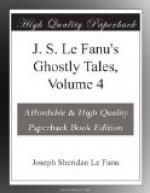Let me, however, first give it a name; for an author can no more despatch a tale without a title, than an apothecary can deliver his physic without a label. We shall, therefore, call it—
The Spectre Lovers
There lived some fifteen years since in a small and ruinous house, little better than a hovel, an old woman who was reported to have considerably exceeded her eightieth year, and who rejoiced in the name of Alice, or popularly, Ally Moran. Her society was not much courted, for she was neither rich, nor, as the reader may suppose, beautiful. In addition to a lean cur and a cat she had one human companion, her grandson, Peter Brien, whom, with laudable good nature, she had supported from the period of his orphanage down to that of my story, which finds him in his twentieth year. Peter was a good-natured slob of a fellow, much more addicted to wrestling, dancing, and love-making, than to hard work, and fonder of whiskey-punch than good advice. His grandmother had a high opinion of his accomplishments, which indeed was but natural, and also of his genius, for Peter had of late years begun to apply his mind to politics; and as it was plain that he had a mortal hatred of honest labour, his grandmother predicted, like a true fortuneteller, that he was born to marry an heiress, and Peter himself (who had no mind to forego his freedom even on such terms) that he was destined to find a pot of gold. Upon one point both agreed, that being unfitted by the peculiar bias of his genius for work, he was to acquire the immense fortune to which his merits entitled him by means of a pure run of good luck. This solution of Peter’s future had the double effect of reconciling both himself and his grandmother to his idle courses, and also of maintaining that even flow of hilarious spirits which made him everywhere welcome, and which was in truth the natural result of his consciousness of approaching affluence.
It happened one night that Peter had enjoyed himself to a very late hour with two or three choice spirits near Palmerstown. They had talked politics and love, sung songs, and told stories, and, above all, had swallowed, in the chastened disguise of punch, at least a pint of good whiskey, every man.
It was considerably past one o’clock when Peter bid his companions goodbye, with a sigh and a hiccough, and lighting his pipe set forth on his solitary homeward way.
The bridge of Chapelizod was pretty nearly the midway point of his night march, and from one cause or another his progress was rather slow, and it was past two o’clock by the time he found himself leaning over its old battlements, and looking up the river, over whose winding current and wooded banks the soft moonlight was falling.
The cold breeze that blew lightly down the stream was grateful to him. It cooled his throbbing head, and he drank it in at his hot lips. The scene, too, had, without his being well sensible of it, a secret fascination. The village was sunk in the profoundest slumber, not a mortal stirring, not a sound afloat, a soft haze covered it all, and the fairy moonlight hovered over the entire landscape.




